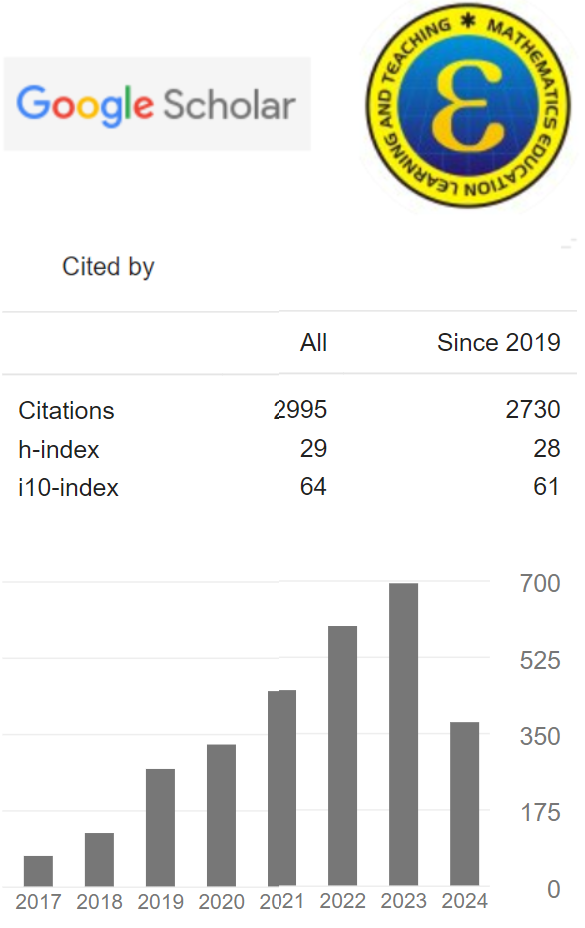Curriculum Reform in East Timor: Curriculum Mathematics Primary School
(1) Universitas Negeri Semarang
(2) Universitas Negeri Semarang
(3) Universitas Negeri Semarang
(4) Universitas Negeri Semarang
(*) Corresponding Author
Abstract
Keywords
Full Text:
PDFReferences
Arends, R. (2008). Learning to Teach, Belajar untuk Mengajar Buku Satu dan Buku Dua. Yogyakarta: Pustaka Pelajar
Curtis, G. (2001). Education in Timor Leste,. ICWA News Letters. California.
Depdiknas Indonesia (2007). Kajian Kebijakan Kurikulum Mata Pelajaran Matematika, Departemen Pendidikan Nasional Badan Penelitian dan Pengembangan Pusat kurikulum, Jakarta.
Hartini, I.R. (2006). Pengembangan Model Pembelajaran Fleksibel Dalam belajar Tuntas Maju Berkelanjutan. Tesis S-2, Universitas Sebelas Maret Solo.
http://www.gamalielschool.org diakses pada tanggal 15 Januari 2009
Indiarto. (2008). Menyimak Perkembangan kurikulum Indonesia.
Isjoni. (2008). Bersinergi Dalam Perubagahan. Yogyakarta: Pustaka Pelajar.
Isjoni. (2008). Memajukan Bangsa dengan Pendidikan. Yogyakarta: Pustaka Pelajar
Koc, Y., Isiksal, M., & Bulut, S. (2007). Elementary school curriculum reform in Turkey. International Education Journal, 8(1), 30-39.
Kusuma, J. W., & Hamidah, H. (2020). Perbandingan Hasil Belajar Matematika Dengan Penggunaan Platform Whatsapp Group dan Webinar Zoom dalam Pembelajaran Jarak Jauh pada Masa Pandemik Covid 19. JIPMat, 5(1). https://doi.org/10.26877/jipmat.v5i1.5942
Leahy, L. (2006). Jika Sains Mencari Makna, Yogyakarta: Kanisius.
Morin, E (2005). Tujuh Materi Penting bagi Dunia Pendidikan, Yogyakarta: Kanisius
Mulyasa E. (2002). Kurikulum Berbasis Kompetensi, Bandung: PT Remaja Rosdakarya
National Science Education Standard (NSES), 1998, â€http://www.nap.edu/ openbook.php?record_id4962&page=104, Washington,
Nicolay, S. (2004). Learning Independence Education in Emercengy and Transition in Timor Leste Since 1999, International Institute for Education Planning. UNESCO, Paris.
Nurhadi dkk. (2004). Pembelajaran kontekstual dan penerapannya dalam KBK,. Penerbit Universitas Negeri Malang.
Pattanayak, Vikram. Physics First in Science Education Reform, Biochemistry and Biophysics,Universit of Pennsylvania http://www.jyi.org/volumes/vol um e6/is sue7/ features/pattanayak.html diakses tanggal 12 November 2009.
Raihani. (2007). Education Reforms in Indonesia in the Twenty-first Century. International Education Journal, 8(1), 172-183. http://iej.com.au .
Richmond, J. E.D. (2007). Bringing critical thinking to the education of developing country professionals. International Education Journal, 8(1), 1-29 http://iej.com.au
Rohani Abdul Hamid. 2004. An Analysis of the Present curriculum in use in Timor Leste Junior Secondary Schools, and an Implementation plan for re-development. World Bank Timor Leste.
Sagala.S. (2008). Konsep dan Makna Pembelajaran, Bandung: Alfabeta
Selvi, K. (2007). Future aims of science curriculum for primary school. Cultura International Journal of Philosophy of Culture and Axiology, 4(2), 176-183.
Soares, P. (2007). O ensino da Ciências Naturais Nas Escolas Secundárias Timorenses. Univercidade do Minho, Portugal.
Srihartanto, E. (2007). Implementasi Pembelajaran PAKEM, Tesis S-2, Universitas Sebelas Maret Solo.
Sulistyani. (2005). Penerapan Model CTL dan STM kaitannya dengan prestasi belajar biologi ditinjau dari kreatifitas siswa. Tesis S-2 Universitas Sebelas Maret Solo.
Suparno, P. (2009). Kajian Kurikulum Fisika SMA/MA Berdasarkan KTSP. Penerbit Universitas Sanata Darma, Yogyakarta.
Trianto. (2009). Mendesain Model Pembelajaran Inovatif Progresif Konsep, landasan dan implementasinya pada kurikulum KTSP. Jakarta: Kencana Prenada Media Group
UNESCO. (2001). â€Science Draft for Timor Leste†Paris.
UNICEF Annual Report, 2001, www///http///unicef_tl.org. East Timor.
Yamin, M. (2008). Paradigma Pendidikan Konstruktivisme. Jakarta: Gaun Persada Press
DOI: 10.24235/eduma.v10i2.8783
Article Metrics
Abstract view : 57 timesPDF - 8 times
Refbacks
- There are currently no refbacks.
Copyright (c) 2022


.png)










